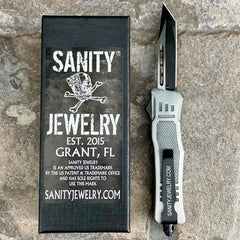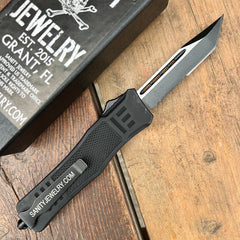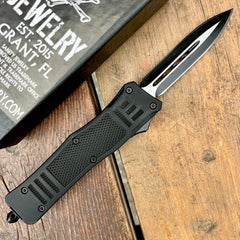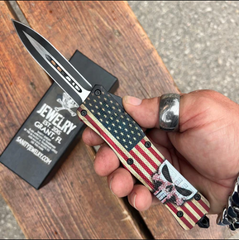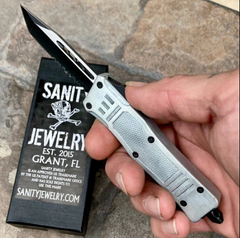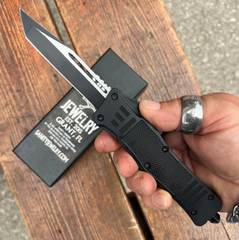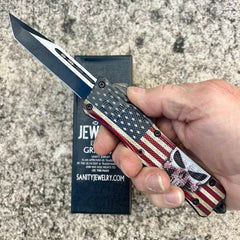OTF knives are remarkable tools that have gained popularity among knife enthusiasts for their unique mechanical function, where the blade deploys straight out of the handle at the press of a button or switch.
However, the legality of owning and carrying OTF knives varies significantly from state to state within the United States. These regulations are subject to complex layers of federal, state, and local laws, which can be perplexing for those interested in collecting or utilizing these knives for everyday carry.
In this comprehensive guide, we will delve into the intricacies of state laws and offer you the clarity you need to navigate the specific legal landscape of OTF knife ownership and carry in different regions.
OTF Knives
OTF, or Out-the-Front knives, refer to a type of pocket knife that has a unique mechanism whereby the blade deploys and retracts directly through the front of the handle. Unlike traditional folding knives, OTF knives are considered automatic knives, with a blade that springs out at the push of a button, making them highly sought after for their speed and convenience. The functionality and novelty of OTF knives, however, mean they often fall into a special category of blade that is subject to a complex tapestry of state laws and regulations.Understanding the intricate tapestry of state laws, federal law, and knife laws is crucial for anyone who carries or intends to carry knives, particularly automatic knives like OTF (Out The Front) knives. The legality of carrying such a pocket knife can vary significantly from one state to another, and what is permissible in one jurisdiction may lead to legal repercussions in another.
It is therefore essential for a person carrying an OTF knife to be well-informed about the regulations that govern their possession, carry, and use, to ensure they are complying with the law and avoiding potential penalties. Knowledge of these regulations is not just about adherence; it's about responsible ownership and being a mindful member of the knife-carrying community.
Factors Affecting Legality of OTF Knives
One of the most significant factors impacting the legality of OTF (Out-the-Front) knives is blade length. State and federal laws often set specific limitations on the length of a blade a person is legally allowed to carry. These restrictions vary widely across different jurisdictions and are crucial for enthusiasts to know before purchasing or carrying an OTF knife.Overstepping these legal boundaries can lead to severe consequences, from fines to criminal charges, for the person carrying the knife. It's imperative that owners and potential buyers consult their local knife laws to ensure compliance and avoid inadvertent legal infractions.
Another pivotal legal aspect to consider is the concealment laws governing OTF knives. These regulations dictate how and whether an individual can carry a concealed knife without infringing on state statutes. Concealment laws can vary wildly from one state to another; some states permit the carrying of concealed automatic knives, including OTF pocket knives, while others may impose a blanket prohibition or require a specific permit.
Being versed in the concealment stipulations is essential for anyone who wishes to carry knives responsibly and lawfully, as the penalties for non-compliance can be stringent. It is highly recommended that individuals take the time to understand these regulations, particularly in the states they reside in or plan to visit, to prevent legal complications.
Permits and Licenses for OTF Knives in the US
Acquiring a permit or license for an OTF knife is another layer of complexity that knife enthusiasts must navigate. In the United States, the requirements for permits and the type of licenses necessary to legally own and carry an OTF knife vary considerably by state. Certain states have stringent regulations that mandate permits for possession or carrying of automatic knives to ensure only qualified individuals handle these tools.
For example, some states require a clean criminal record or even specific occupational necessities before issuing a permit. Conversely, other states operate with more lenient practices, offering unrestricted ownership to law-abiding citizens without the need for special authorization.
It is crucial for OTF knife owners to comprehend the nuances of their state's permit system to maintain adherence to the law and secure their ability to exercise knife ownership rights without legal repercussions.
State Knife Laws Overview
In the United States, federal law plays a crucial role in regulating the possession, sale, and transportation of OTF (Out-the-Front) knives. It is essential for enthusiasts and prospective owners to understand these federal regulations to ensure compliance and avoid legal complications. Federal law specifically addresses the interstate commerce of these automatic knives, which includes their transport across state lines.However, while federal legislation provides a framework, it often defers to individual states to enforce and elaborate upon specific restrictions and allowances regarding the ownership and use of OTF knives within their jurisdictions. Consequently, it is paramount for any person involved with OTF knives to be knowledgeable not only about federal law but also the varying knife laws at the state level.
State Knife Laws Overview
In understanding the complexities of knife regulations across the United States, it's crucial for carriers to be well-versed in federal and state laws governing OTF (Out The Front) knives. Federal law sets the foundation, while state law can vary dramatically, with some states enforcing more stringent rules regarding knives considered dangerous weapons.
State-by-State Legality of OTF Knives
Alabama: The Heart of Dixie allows the open carry of a pocket knife, while a concealed carry permit is needed for anything defined under state law as a dangerous weapon. Fixed blade knives are unrestricted when openly carried.
Alaska: A state with significant wilderness, Alaska permits most knife carries, including fixed blade, gravity knives, and balisong knives, with no blade length restriction. However, it is illegal to conceal carry a dagger, dirk, or other deadly weapons without a permit.
Arizona: Arizona law does not restrict the open carry of knives, and residents can legally carry a pocket knife or fixed blade. Concealed carry of an automatic knife or any blade longer than 4 inches requires no permit.
Arkansas: Known for its relaxed weapon laws, Arkansas allows open carry and conceal carry of any blade length, with the exception of knife carry by a convicted felon.
California: California knife laws distinguish between folding and fixed blade knives; a pocket knife with a blade less than 2 inches may be carried concealed, but conceal carry of switchblade knives with blades longer than 2 inches is prohibited.
Colorado: While open carry of a pocket or bowie knife is permissible, concealed carry of gravity knives and switchblades is illegal in Colorado.
Connecticut: The state permits pocket knives with non-locking blades less than four inches long. Ballistic knives, automatic knives, and dirks are banned altogether.
Delaware: Conceal carry requires attention, as dangerous weapons, such as switchblades or automatic knives, are restricted.
Florida: Florida's knife laws permit both open carry and concealed carry of a pocket knife, however, anything over 4 inches may be classified as a concealed weapon and requires a permit.
Georgia: All knives can be open carried. However, any blade longer than 5 inches requires a weapons' license for concealed carry.
Hawaii: In Hawaii, butterfly knives and switchblades are considered dangerous weapons and are illegal, while a common pocket knife is exempt from such restrictions.
Idaho: No state law precludes the carry of a hunting knife or a common pocket knife in Idaho. Local ordinances may apply.
Illinois: Automatic knives are allowed only if one is a military personnel or law enforcement officer, but ballistic knives are banned.
Indiana: Indiana has relaxed laws, allowing for the open carry and conceal carry of any knife except a ballistic knife.
Iowa: Open carry of knives is generally allowed, but concealment laws apply to any dangerous weapon.
Kansas: The state does not generally restrict the right to bear arms, regardless of whether it's an open carry or concealed knife.
Kentucky: While certain knives, such as switchblades and butterfly knives, are banned, common pocketknives can be openly carried in Kentucky.
Louisiana: Louisiana prohibits the carrying of knives and other dangerous weapons except by those with a concealed handgun permit.
Maine: The state allows for open carry of knives without any restrictions on blade length, but switchblades are not permitted.
Maryland: Balisong knives (butterfly) and similar weapons are illegal to possess in Maryland. Pocketknives with blades no longer than 4 inches may be carried concealed.
Massachusetts: The state has limited restrictions on legal knives, including a ban on switchblades and ballistic knives. Pocketknives must be hidden from view to avoid possible trouble with law enforcement.
Michigan: Michigan knife laws allow the carry of a pocket knife; however, automatic and butterfly knives are restricted due to the potential for being hazardous. Pen knives are generally regarded as lawful.
Minnesota: Carrying most knives is lawful, but blades longer than 4 inches require a permit for conceal carry.
Mississippi: The Magnolia State allows for the open carry of fixed blade knives and pocket knives. However, carrying of a concealed weapon by a convicted felon is prohibited.
Missouri: Restrictions include the prohibition of concealing knives which are deemed to be weapons free zones.
Montana: The state permits the open carry of most knives but prohibits carrying switchblades and ballistic knives.
Nebraska: The state allows the open carry of most knives, including switchblades and butterfly knives. Concealing a dangerous weapon is an offense.
Nevada: Nevada has few restrictions on knife carrying. Some knives are illegal to possess altogether, including ballistic knives.
New Hampshire: Pocketknives and other common fixed blade knives can be carried without any restrictions in New Hampshire.
New Jersey: New Jersey knife laws prohibit the carry of switchblades, gravity knives, and any knife with a blade longer than 5 inches without a valid reason.
New Mexico: New Mexico does not restrict the open or concealed carry of most knives. Weapons classified as deadly are prohibited.
New York: In New York, carrying certain knives is prohibited unless specifically exempted. These knives include switchblades, ballistic knives, and any knife with a blade over 4 inches in length.
North Carolina: North Carolina allows for the open carry of most knives, including pocketknives and fixed blades, but concealing any weapon is prohibited without a valid permit.
North Dakota: The state permits open carry of most knives. However, carrying a concealed weapon without a permit is prohibited.
Ohio: Ohio law prohibits the carry of certain knives, such as switchblades and automatic knives, but allows for open carry and conceal carry of common pocketknives.
Oklahoma: Oklahoma statutes list several banned weapons throughout the state; however, no knife is mentioned.
Oregon: In Oregon, carrying a concealed weapon is prohibited without a permit for any knife other than a pocketknife.
Pennsylvania: Pennsylvania permits open carry of most knives, but restrictions apply to switchblades and automatic knives. Concealing any dangerous weapon is considered a criminal offense.
Rhode Island: The state requires individuals to have an official reason for carrying certain weapons, including knives with blades longer than 3 inches.
South Carolina: South Carolina permits the open carry of most knives, but carrying a concealed weapon without a permit is illegal.
South Dakota: The state has few restrictions on knife possession and allows for open carry of most knives, including switchblades and butterfly knives.
Tennessee: Tennessee law prohibits the carry of switchblades and automatic knives, but allows for open carry and concealed carry of most other knives.
Texas: In Texas, any knife with a blade over 5.5 inches is considered illegal to carry unless in one's own premises or vehicle.
Utah: Utah permits the open and conceal carry of most knives, including switchblades and ballistic knives.
Vermont: Vermont has no restrictions on knife carrying, allowing for the open carry of any type of knife.
Virginia: Virginia law permits the open carry and conceal carry of most knives, but switchblades are prohibited.
Washington: In Washington state, carrying a concealed weapon without a permit is illegal. Most other knives are allowed to be carried openly.
West Virginia: West Virginia allows for the open carry and conceal carry of most knives, including switchblades and butterfly knives.
Wisconsin: Wisconsin law prohibits the concealed carry of switchblades and certain knives with blades over 3 inches, but allows open carry without any restrictions on blade length.
Wyoming: Wyoming permits open and concealed carry of most knives, including switchblades and ballistic knives.
The state's position on OTF knives is often interpreted differently by local jurisdictions, creating a complex patchwork of regulations. These summaries provide only a snapshot, and it's recommended that individuals consult legal counsel or law enforcement for clarification, especially regarding weapons free zones, unlawful intent, and legal precedent regarding knives.
School property, police stations, and public buildings often have specific provisions—a concealed weapon on school buses or within school property could lead to significant penalties, including up to five years imprisonment, depending on the jurisdiction and local ordinances.
For self-defense purposes, some states may offer particular leeway, and states like Michigan have knife laws that accommodate the legal purchase and carry of certain knives by military personnel.
It's crucial for knife owners, such as those wishing to carry a common pocket knife, fixed blade knife, or an automatic knife, to understand the varied landscape of knife laws—a reality that underscores the importance of being informed about one's rights and responsibilities when choosing to carry such knives.
Impact on Knife Enthusiasts and Owners
When traveling across state lines, individuals who carry knives, particularly OTF (out-the-front) knives, must be keenly aware of varying knife laws that can drastically change from one jurisdiction to another. The legal landscape for knife carrying is not uniform and can differ significantly, with some states having lenient policies while others enforce strict prohibitions.Prior to travel, it is essential for knife owners to conduct thorough research on the knife laws applicable in their destination states, as well as any intermediate locations they may pass through. Failure to comply with the local regulations could result in legal complications, ranging from fines to possible arrest. It is not enough to be compliant in one's home state; understanding and adhering to the laws of all states along one's travel route is a crucial part of responsible knife ownership and carry.
Safe & Responsible Knife Ownership
Safety and responsible ownership are paramount considerations in the context of knife carry, especially given the grave consequences of possessing a weapon unlawfully. At the federal level, laws concerning weapons can set the foundation for overarching regulations, but ultimately, state law governs the carry of knives, and it is subject to specific interpretations by local jurisdictions and prosecuting attorneys.In scenarios where individuals may inadvertently run afoul of these complex legal frameworks, the repercussions can be severe. Responsible knife owners must take proactive steps to ensure they use their knives in a safe manner, aligned with both federal and state guidelines to mitigate any risk of legal complications.
Additionally, consulting legal counsel before carrying knives into diverse jurisdictions provides added assurance against the potential misuse of weapons, reinforcing the dedication to uphold safety standards within the community.
Navigating the Legal Maze: Concluding Thoughts on Knife Legislation
In conclusion, a comprehensive understanding of the varied knife laws across the United States is vital for any knife enthusiast or owner. States regulate the carry of knives differently, with particulars on blade length, knife types, and the distinctions between open and concealed carry.Awareness of such regulations, especially when crossing state lines, cannot be overstated. Compliance with local knife laws safeguards individuals from legal repercussions, ensuring that knife ownership remains a right exercised with respect and responsibility. It is incumbent upon all knife owners to prioritize safety, act within the bounds of the law, and seek legal advice when necessary.
As a community, it is within our collective interest to promote responsible ownership and foster an environment where the legitimacy of knife carrying is preserved and respected.
OTF Knives For Sale Online at Sanity Jewelry
At Sanity Jewelry, enthusiasts and collectors will find a vast selection of knives and unique biker jewelry to suit their tastes and needs. From the swift action of automatic knives to the precision of folding and OTF (out-the-front) knives, our inventory is extensive.Whether you're in the market for a reliable pocket knife for everyday tasks, a sturdy hunting knife for your outdoor adventures, or a signature four-finger ring to add to your biker jewelry collection, Sanity Jewelry has it all. Our range includes tire thumpers and guardian bells, adding an extra touch of personality to your gear.
Visit Sanity Jewelry today to browse our full collection and make your next purchase with confidence, knowing you have access to quality and variety at your fingertips.
Frequently Asked Questions
Can I legally purchase knives online?
Yes, it is legal to purchase knives online in the United States. However, buyers must comply with their state's knife laws and any additional regulations that may apply.
Are OTF knives legal in California?
OTF knives are legal in California if the blade is under 2 inches and complies with state knife laws. It is essential to check local regulations before purchasing or carrying an OTF knife.
What knives are legal to own, possess, and carry in Florida?
Florida allows the ownership, possession, and open carry of knives, including switchblades. However, certain restrictions may apply to specific locations such as schools and government buildings.
What's the difference between a switchblade knife and an OTF knife?
A switchblade knife typically requires a button or lever to activate the blade, whereas an OTF knife has a sliding mechanism that releases the blade from the handle with just one hand. Additionally, switchblades are generally restricted by federal and state laws, while OTF knives may be legal in some states depending on blade length and other regulations.
So, if you're looking for an OTF knife in a specific state, it is crucial to research and understand the local laws before purchasing one. Overall, both types of knives have their distinctions and legal considerations that must be taken into account by responsible owners. At Sanity Jewelry, we prioritize safety and compliance with all applicable laws, ensuring our customers are informed and well-equipped to make responsible purchases.
Are OTF knives considered to be a dangerous or deadly weapon?
As with any weapon, OTF knives can be dangerous if not used responsibly and in accordance with the law. It is essential to follow all local regulations and use knives safely to minimize potential harm.
How do I know if my knife is legal to carry in my state?
Researching and understanding state knife laws is the best way to determine if your knife is legal to carry. It is also advisable to consult with legal counsel for additional guidance on particular situations. The American Knife & Tool Institute (AKTI) provides a comprehensive guide to state knife laws on their website, making it an excellent resource for knife owners and enthusiasts.
Additionally, individual state government websites also provide information on their specific knife laws. It is crucial to stay updated on any changes or amendments to knife laws in your state and other states you may travel through. Responsible ownership means staying informed and compliant with all applicable regulations. So, always do your research before carrying a knife in a new location.

